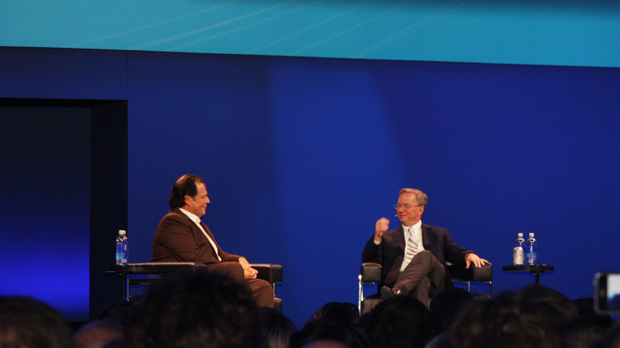Legacy firms should follow Apple: Schmidt

Google chairman and former CEO, Eric Schmidt, today opened up on past mistakes and gave delegates of Dreamforce 2011 advice on how not to end up stranded selling legacy technology to dwindling numbers of customers.

Salesforce CEO Marc Benioff and Eric Schmidt
(Credit: Suzanne Tindal/ZDNet Australia)
Schmidt commented on his previous employer Sun's inability to reduce the cost of its hardware to compete with Pentium servers and how that had cost the business. He said a similar problem had happened at Novell, when the speed the company moved at meant that technology consolidated around the alternate platform.
"The lesson to be learned over and over again in tech is that it moves. If you don't move to it very quickly, it's very hard to get back into the space," he said.
Given new platforms for developing apps in the cloud, Schmidt said that companies had to be speeding up their development model.
"Just think of a way to release a new version of your software every day, without bricking it," he said.
"Once you've mastered that, do it globally. Once you've done all of that, you've got a world-class software development organisation.
"The tools are good enough now that you can operate that way."
Incumbents like Microsoft find it hard to move to new models like that, since they have a commitment to keep customers happy and are stuck on big, infrequent releases.
Yet, while Schmidt said it was hard for older companies to move to new platforms, he said it was possible and companies should look to former Apple CEO Steve Jobs to see how to do it.
"What Steve has done in Apple is certainly the best CEO performance in the world in 50 years and maybe 100 yeas, because not only did he do this once, he did it twice," Schmidt said.
"I think we've all benefited from that innovation."
He said it was possible to model on Apple's experience and say "OK what's that new brilliant thing". It was necessary to think like a start-up and forget all the issues that stop the company from doing it.
"You've got to take the current company and get it there," he said. "Figure out how to lead it into this new platform."
When asked about what the difference was between Jobs and Microsoft CEO Steve Ballmer in terms of handling the new platforms, Schmidt said simply "Well, there's differences in ability."
Then he moved away from anything personal and said that Microsoft was built around a licensing model and not organised around the consumer.
"Apple proves that if you organise around the consumer, the rest of it will follow," he said. "Try and figure out how to solve the consumer problem and then the revenue will show up."
He said that the trick was to not let the idea of what the consumer wants out of your sight.
"Engineers trying to solve technical problems have little experience of what consumer wants," he said.
"As a computer scientist, I love that complexity. I didn't understand that other people wouldn't love that complexity."
Doing this will bring about an epic shift, he said.
Facebook founder, Mark Zuckerberg, was another example of an impressive leader, according to Schmidt, who said that people will look back and consider him one of the great leaders.
But he won't be the last, he said.
"There will be one after him, just as there was one after my contemporaries."
He said he didn't know who the next great leader would be, but that he wished he did.
"What I do know is that the next generation of these leaders will be something involving mobile, local, social."